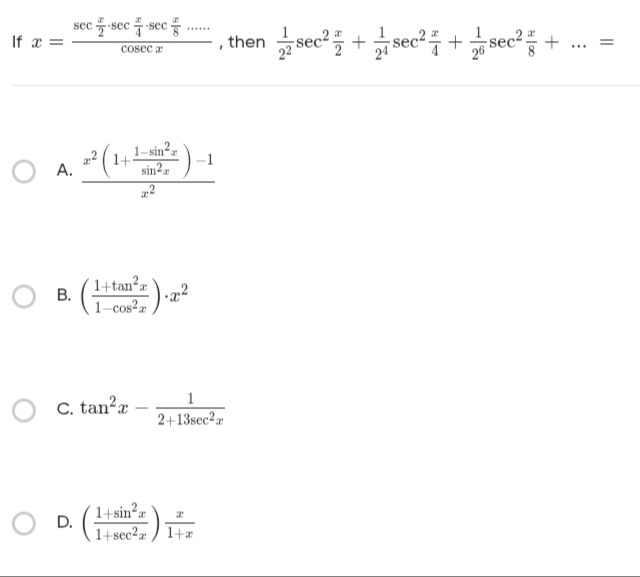Question
Question: If $x = \frac{sec \frac{x}{2} \cdot sec \frac{x}{4} \cdot sec \frac{x}{8} \cdots}{cosec x}$, then $\...
If x=cosecxsec2x⋅sec4x⋅sec8x⋯, then 221sec22x+241sec24x+261sec28x+⋯=

x2x2(1+sin2x1−sin2x)−1
(1−cos2x1+tan2x)⋅x2
tan2x−2+13sec2x1
(1+sec2x1+sin2x)1+xx
x2x2(1+sin2x1−sin2x)−1
Solution
The given equation is x=cosecxsec2x⋅sec4x⋅sec8x⋯.
We can write this as x=(∏n=1∞sec2nx)sinx. Using the identity secθ=cosθ1, we have ∏n=1∞sec2nx=∏n=1∞cos2nx1. We know the infinite product formula ∏n=1∞cos2nx=xsinx for x=0. Substituting this into the expression for x: x=(xsinx1)sinx=sinxx⋅sinx=x. This confirms that the given equation is an identity for x=0.
We need to find the value of the series S=221sec22x+241sec24x+261sec28x+⋯=∑n=1∞4n1sec22nx.
Consider the identity ∏n=1∞cos2nx=xsinx. Taking the natural logarithm of both sides, we get: ln(∏n=1∞cos2nx)=ln(xsinx) ∑n=1∞ln(cos2nx)=ln(sinx)−lnx.
Differentiate both sides with respect to x: dxd(∑n=1∞ln(cos2nx))=dxd(ln(sinx)−lnx) ∑n=1∞dxd(ln(cos2nx))=sinxcosx−x1 ∑n=1∞cos2nx1⋅(−sin2nx)⋅2n1=cotx−x1 ∑n=1∞−2n1tan2nx=cotx−x1 ∑n=1∞2n1tan2nx=x1−cotx.
Differentiate both sides again with respect to x: dxd(∑n=1∞2n1tan2nx)=dxd(x1−cotx) ∑n=1∞dxd(2n1tan2nx)=−x21−(−cosec2x) ∑n=1∞2n1⋅sec22nx⋅2n1=cosec2x−x21 ∑n=1∞4n1sec22nx=cosec2x−x21.
The series we need to evaluate is S=∑n=1∞4n1sec22nx. So, S=cosec2x−x21.
Now let's check the options. Option A: x2x2(1+sin2x1−sin2x)−1=x2x2(1+sin2xcos2x)−1=x2x2(1+cot2x)−1=x2x2cosec2x−1=cosec2x−x21. This matches our result.
The final answer is cosec2x−x21. Let's check if this is equivalent to Option A. Option A is x2x2(1+sin2x1−sin2x)−1. We have 1−sin2x=cos2x. So, 1+sin2x1−sin2x=1+sin2xcos2x=1+cot2x=cosec2x. Substituting this into Option A: x2x2(cosec2x)−1=x2x2cosec2x−x21=cosec2x−x21. So, Option A is indeed equal to the value of the series.
